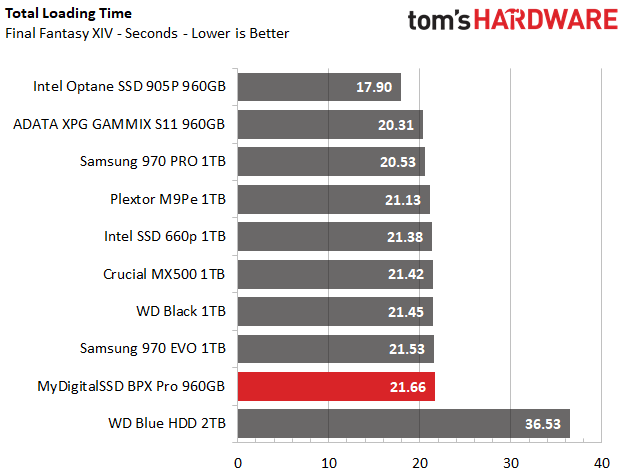MyDigitalSSD BPX Pro NVMe SSD Review: Big on Endurance, Small on Price
Why you can trust Tom's Hardware
MyDigitalSSD BPX Pro (960GB)
Pros:
- Great sequential performance
- Class leading endurance ratings
- Good power efficiency
Cons:
- Lower than average application performance
Verdict: The MyDigitalSSD BPX Pro is a good value M.2 NVMe SSD option for many, especially media creators. The BPX Pro offers a good balance of power efficiency, comes with a five-year warranty, and given its competitive pricing, it delivers an impressive performance to endurance ratio.
Rating: ★★★★
Comparison Products
We included the Plextor M9Pe, Intel SSD 660p, Adata XPG Gammix S11, and WD Black in our test pool. We also threw in both the Samsung 970 EVO and PRO. We also included a Crucial MX500 to see if PCIe SSDs are really worth the extra money over SATA drives.
Trace Testing – PCMark 8 Storage Test 2.0
PCMark 8 is a trace-based benchmark that uses Microsoft Office, Adobe Creative Suite, World of Warcraft, and Battlefield 3 to measure the performance of storage devices in real-world scenarios.
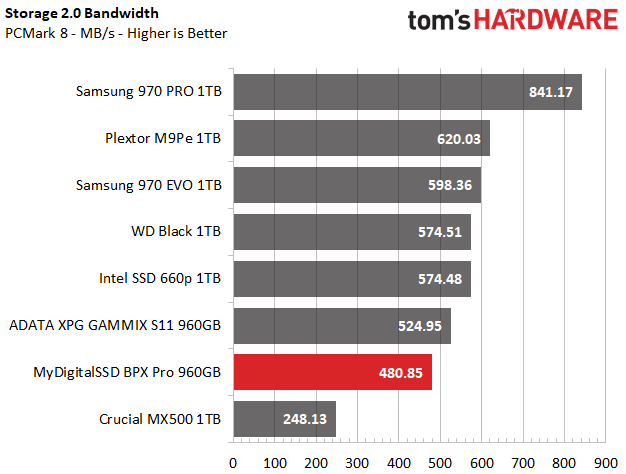
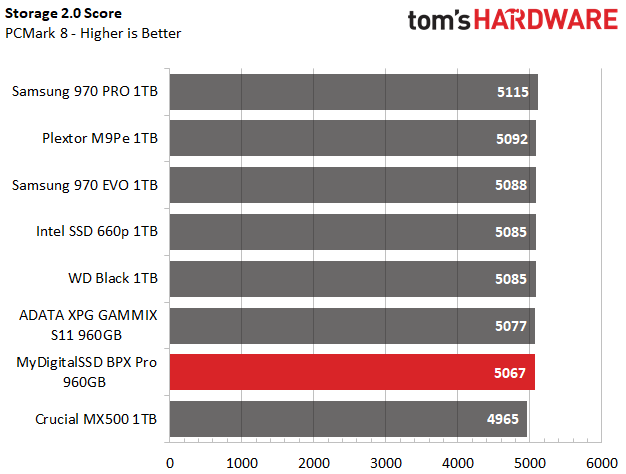
The BPX Pro's 480MB/s of bandwidth was nearly twice the MX500. While this was faster than the SATA-based drive, the BPX Pro lagged the other PCIe NVMe SSDs, even the “lower-end“ Intel SSD 660p.
Get Tom's Hardware's best news and in-depth reviews, straight to your inbox.
Game Scene Loading - Final Fantasy XIV
The Final Fantasy XIV StormBlood benchmark is a free real-world game benchmark that easily and accurately compares game load times without the inaccuracy of using a stopwatch.
Like the 480GB model, the 960GB BPX Pro had the slowest total game load time of the SSDs. The BPX Pro was still roughly 40% faster than an HDD.
Transfer Rates – DiskBench
We use the DiskBench storage benchmarking tool to test file transfer performance with our own custom 50GB block of data. Our data set includes 31,227 files of various types, like pictures, PDFs, and videos. We copy the files to a new folder and then follow up with a read test of a newly-written 6 GB file.
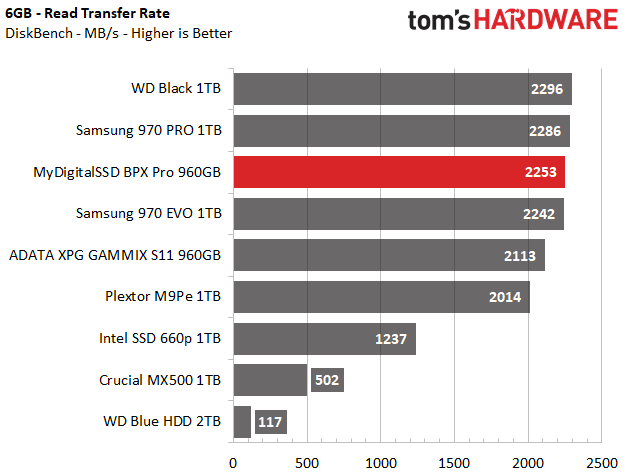
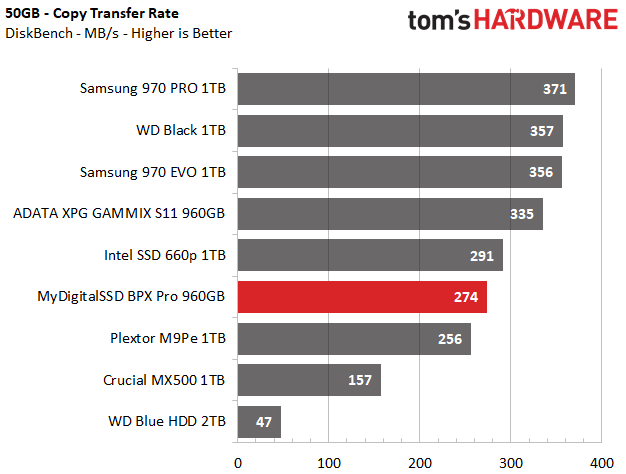
The BPX Pro outperformed the MX500 and M9Pe with an average copy rate of 274MB/s, but fell behind most of the other drives. During the zip file reading test, however, it ranked third with an average read rate of 2253MB/s. It even beat the Samsung 970 EVO.
SYSmark 2014 SE
Like PCMark, SYSmark uses real applications to measure system performance. SYSmark takes things much further, however. It utilizes fourteen different applications to run real workloads with real data sets to measure how overall system performance impacts the user experience. BAPCo's SYSmark 2014 SE installs a full suite of applications for its tests, which includes Microsoft Office, Google Chrome, Corel WinZip, several Adobe software applications, and GIMP. That also makes it a great test to measure the amount of time it takes to install widely-used programs after you install a fresh operating system.
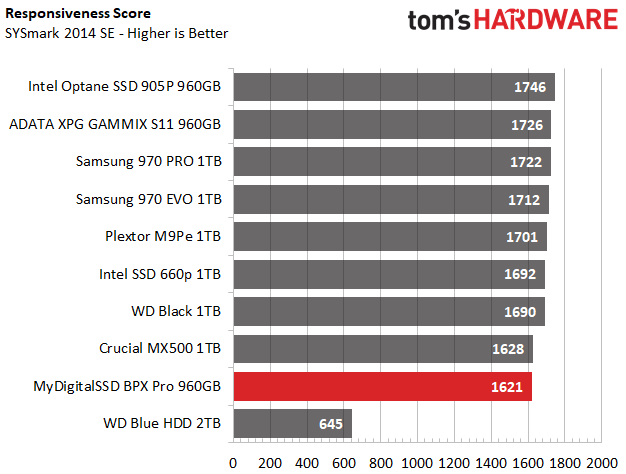
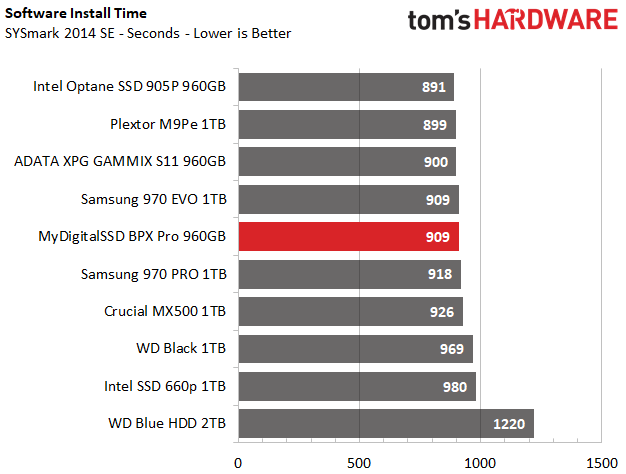
MyDigitalSSD’s BPX Pro installed Sysmark two seconds faster than the 480GB model, which was on par with the Samsung 970 EVO and faster than the 970 PRO. The responsiveness score landed below the MX500 and all the NVMe SSDs.
ATTO
ATTO is a simple and free application that SSD vendors commonly use to assign sequential performance specifications to their products. It also gives us insight into how the device handles different file sizes.
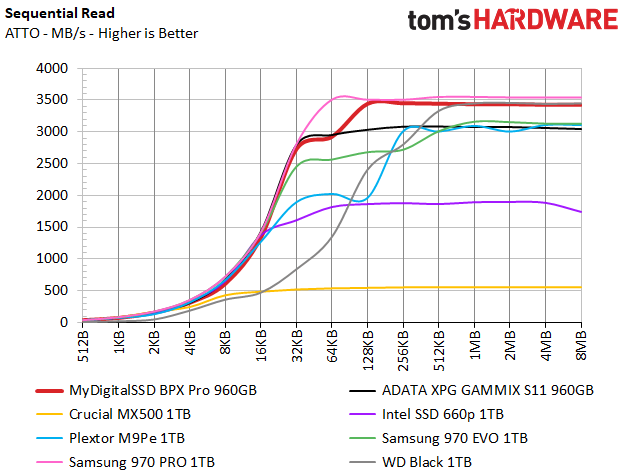
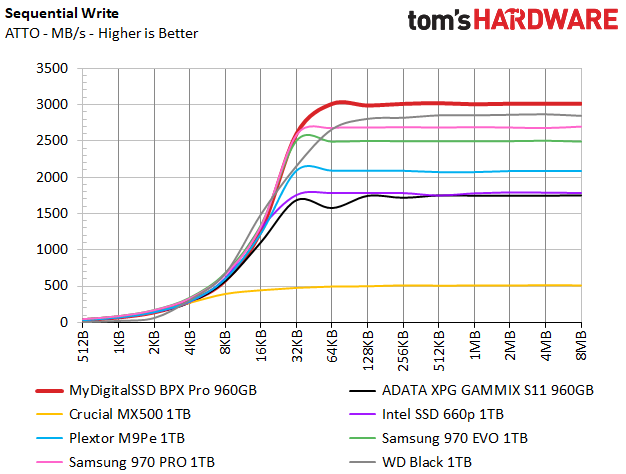
The 960GB BPX took the overall lead with 3.5/3.0 GB/s of read/write throughput.
Anvil's Storage Utilities
Anvil's Storage Utility is a commonly-referenced benchmark that simplifies the complex IOMETER benchmark and its underlying Dynamo engine with a one-click software wrapper.
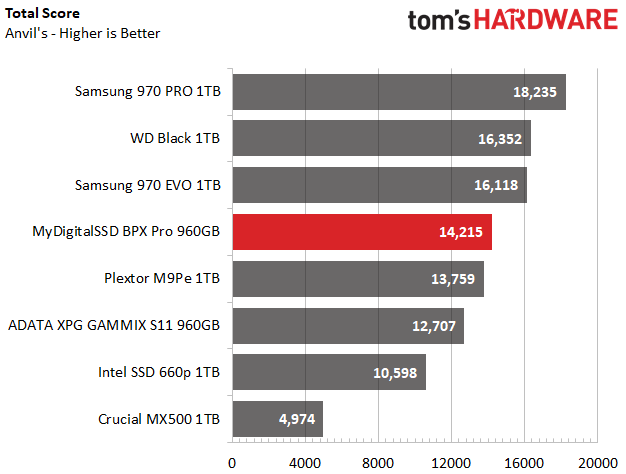
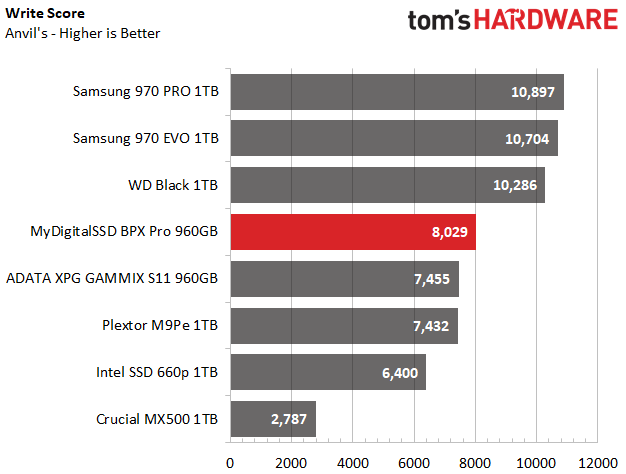
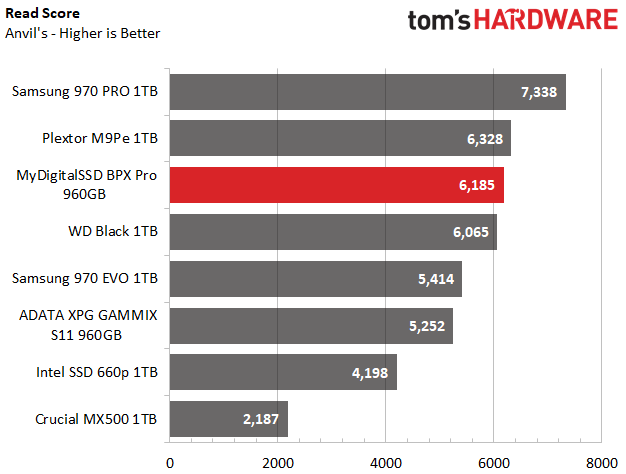
The BPX Pro ranked third in read performance in Anvil’s Storage Utilities, but write performance isn't as impressive, so the drive slips to fourth place overall.
CrystalDiskMark
CrystalDiskMark (CDM) is a simple and easy to use file size benchmarking tool.
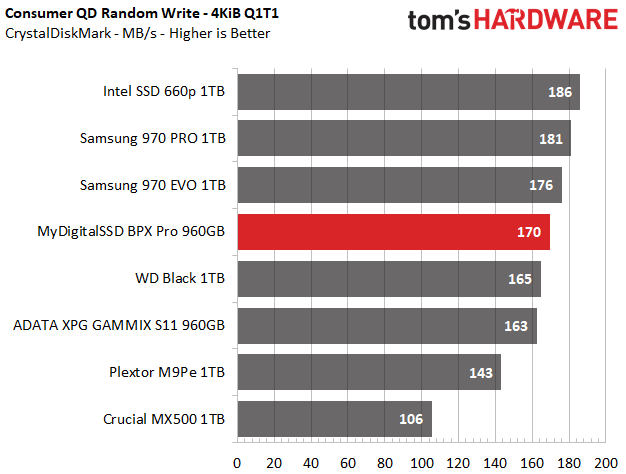
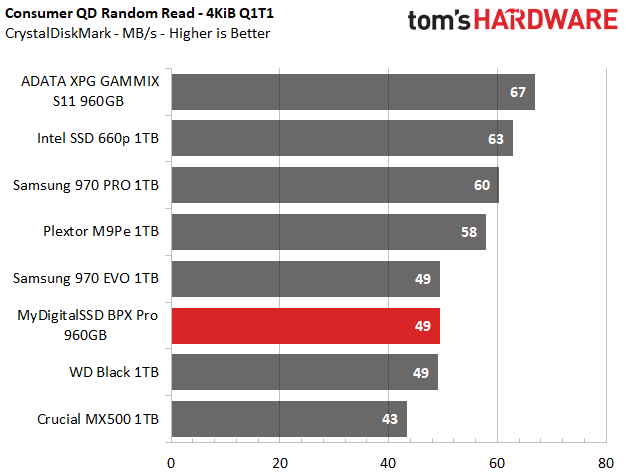
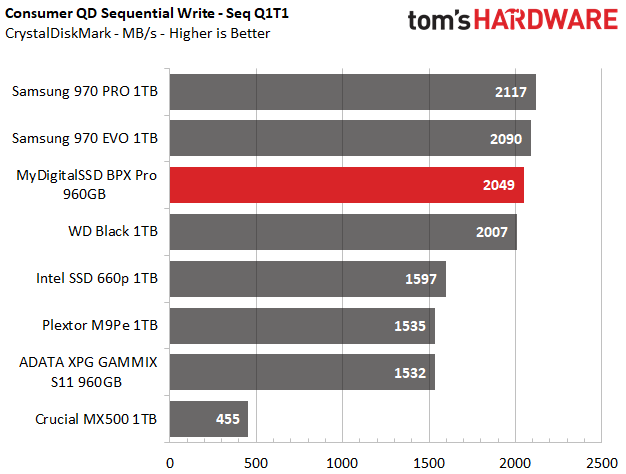
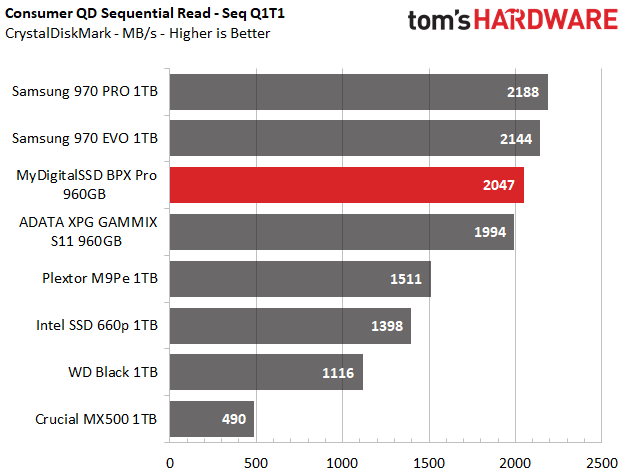
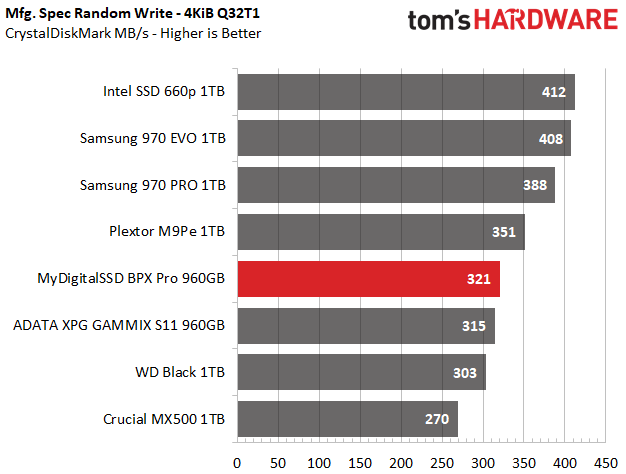
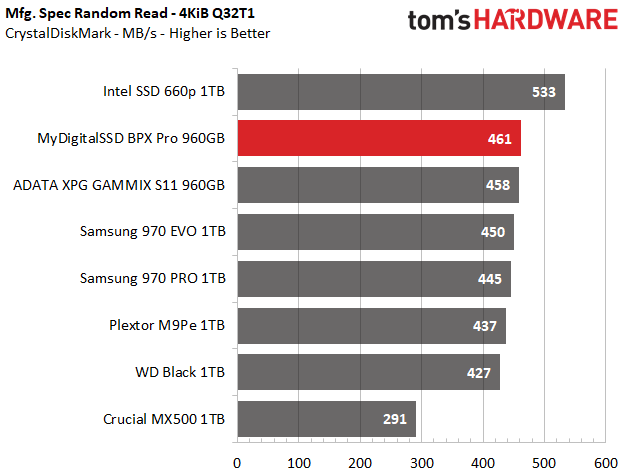
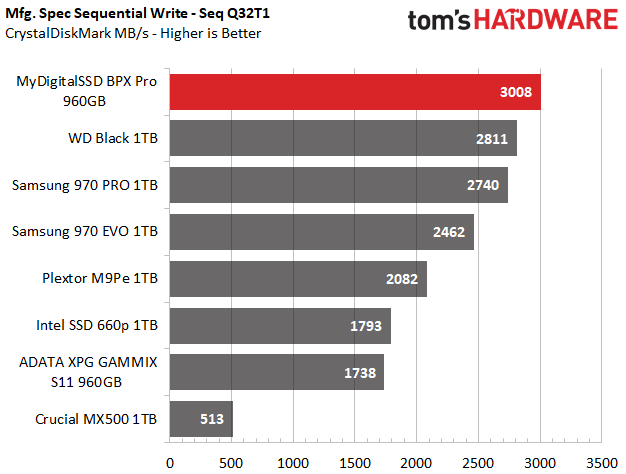
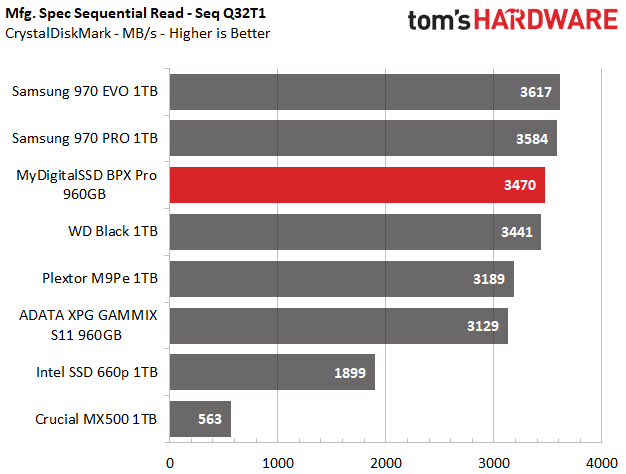
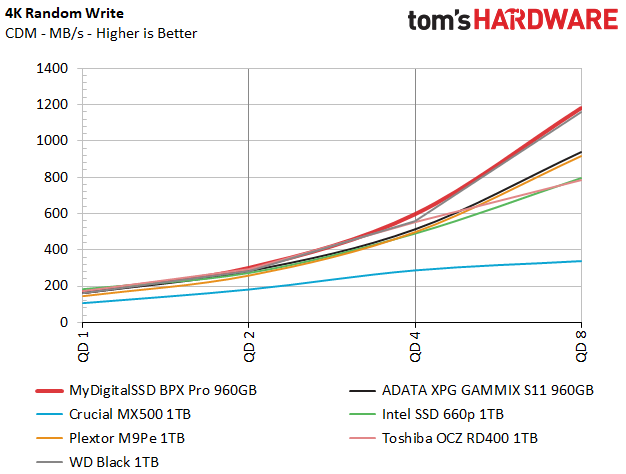
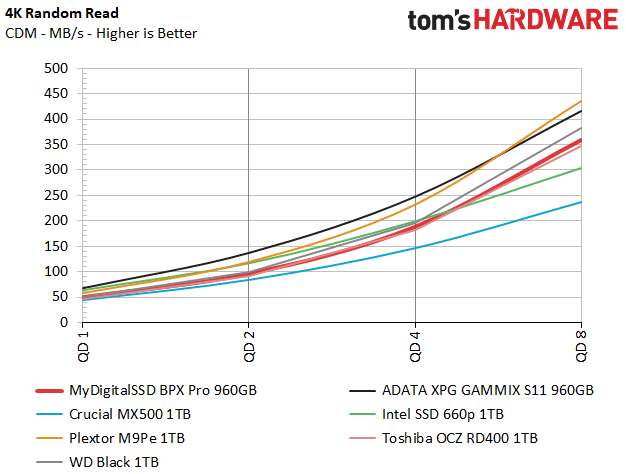
Focusing on the all-important QD1 results, the BPX Pro provided roughly 2GB/s of sequential read/write throughput, while 4K random performance was average. Like the 480GB model, the BPX Pro’s QD1-8 4K random read speed is average, but the write performance leads the pack.
Sustained Sequential Write Performance
Official write specifications are only part of the performance picture. Most SSD makers implement an SLC cache buffer, which is a fast area of SLC-programmed flash that absorbs incoming data. Sustained write speeds can suffer tremendously once the workload spills outside of the SLC cache and into the "native" TLC or QLC flash. We hammer the SSDs with sequential writes for 15 minutes to measure both the size of the SLC buffer and performance after the buffer is saturated.
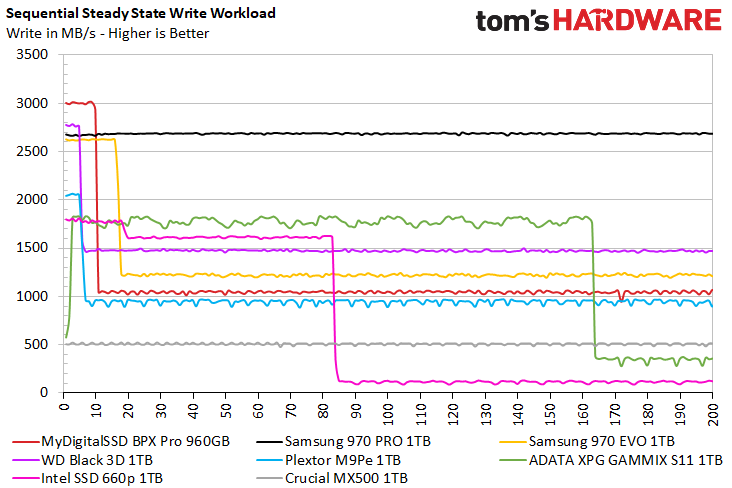
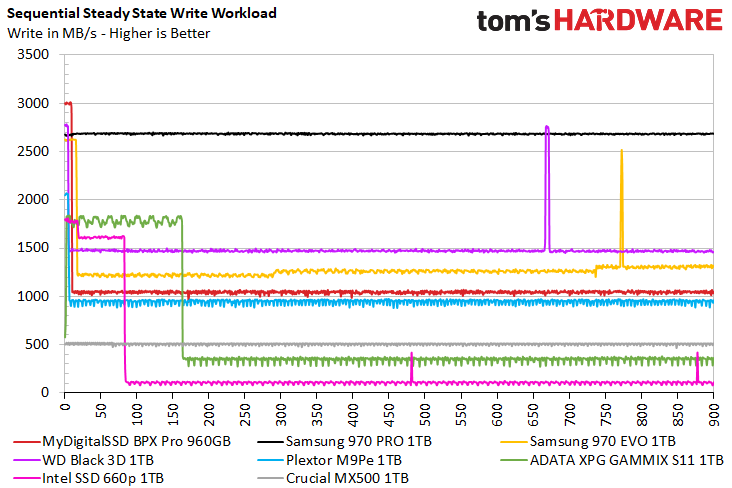
The 960GB BPX Pro, like the 480GB model, has a 30GB SLC write cache buffer that can fill in as little as 10 seconds if you can write to it at 3GB/s. Beyond that, the BPX Pros delivered a consistent 1050 MB/s of write throughput.
Power Consumption
We use the Quarch XLC Programmable Power Module to gain a deeper understanding of power characteristics. Idle power consumption is a very important aspect to consider, especially if you're looking for a new drive for your laptop. Some SSDs can consume watts of power at idle while better-suited ones sip just milliwatts. Average workload power consumption and max consumption are two other aspects of power consumption, but performance-per-watt is more important. A drive might consume more power during any given workload, but accomplishing a task faster allows the drive to drop into an idle state faster, which ultimately saves power.
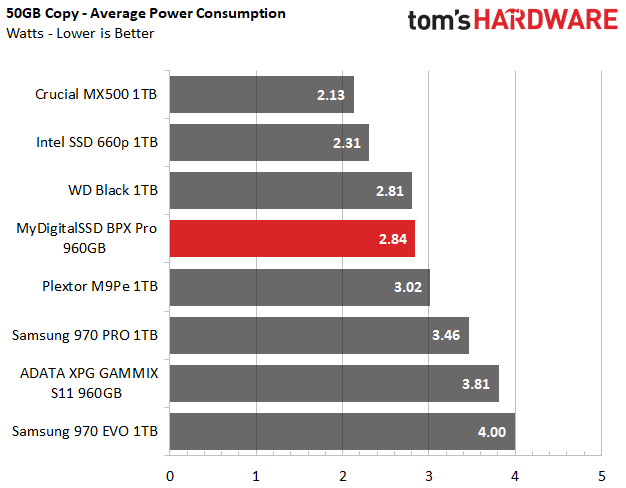
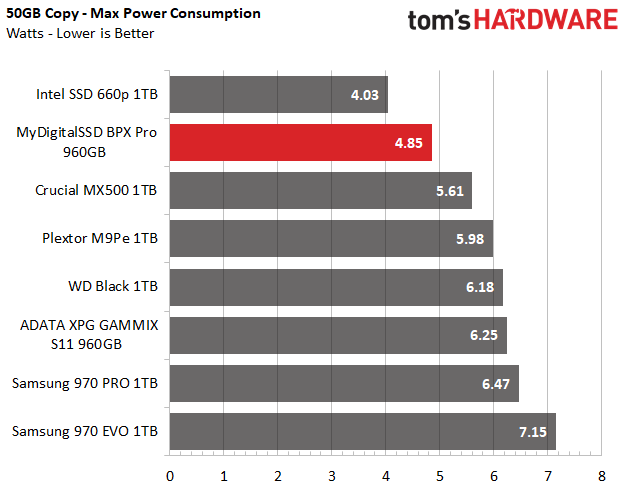
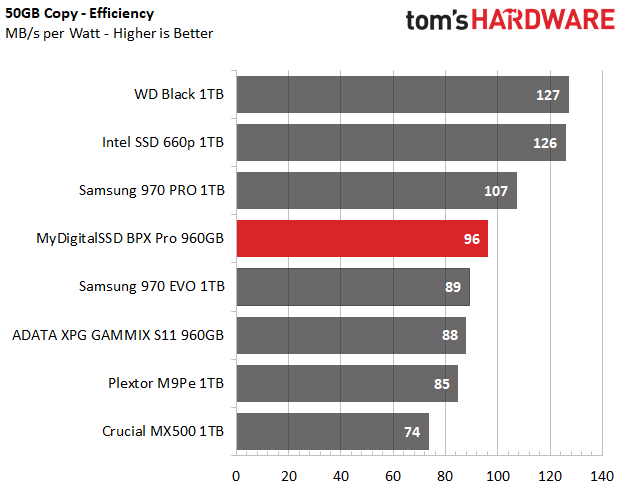
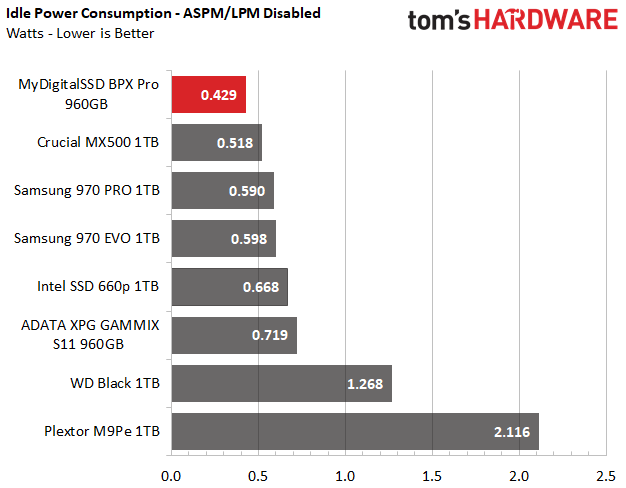
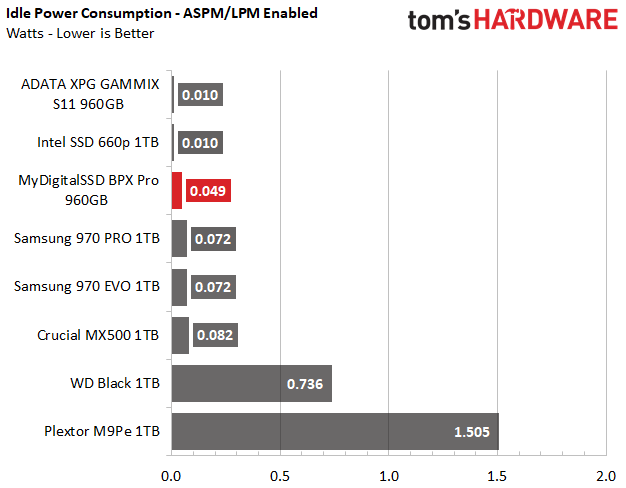
The BPX Pro averaged 2.84W during the 50GB file copy test, which was roughly the same as the WD Black. However, the BPX Pro's maximum power consumption is much better at just 4.85W during the copy test. This helped the BPX Pro rank fourth overall in efficiency with an average of 96MB/s per watt.
The BPX Pro had the best idle power consumption with ASPM disabled and is just behind the GAMMIX S11 and 760p with ASPM enabled.
MORE: Best SSDs
MORE: How We Test HDDs And SSDs
MORE: All SSD Content
Current page: 960GB Performance Results
Prev Page 480GB Performance Results Next Page 1.92TB Performance Results
Sean is a Contributing Editor at Tom’s Hardware US, covering storage hardware.
-
elpresidente I pre-ordered one in 960gb. Latency was worse than my xg3 from years ago- maybe tlc vs mlc difference? Was always >100us iirc, about 3x higher.Reply -
Peter Martin lower than average application performance... hello, samsung, give me an NVMe from Samsung any dayReply -
Krazie_Ivan looks like fantastic value for long-term ownership with heavy write use, which fits a niche market perfectly. i'd ideally run a smaller EVO primary for OS/apps with Magician's Turbo enabled, and paired through StoreMI to conserve space with a large HDD for large apps/games, but have this BPX Pro for vid editing use instead of a dedicated media file HDD.Reply
...just waiting on Zen2 for a dual M.2 mobo -
ron baker Turbo doesn't work on the nvme 970 ... Something they dont shout about ...means you can still run it on your old sata SSD for equiv speeds , tho .Reply -
cat1092 Just purchased the BPX PRO a couple of days ago, the 512 (480GB) version from Amazon for an amazing $129.99.Reply
If it's anything close to my three previous gen BPX drives, will be fantastic. My only issue with these, although running in PC's didn't affect me, were these probably not best suited for notebooks, as these generates heat. Mine are cooled with a Sintech PCIe adapter with 50mm fan attached. The fans has been upgraded to those with ball bearing type, as the included ones were of the sleeve or rifle type & became noisy at boot, would quieten in a minute or so.
Hopefully this newer version will run much cooler as posted in specs, so will be suitable for everyone in need of an NVMe SSD. BTW, this latest BPX PRO has been called the 'Samsung 970 EVO Killer' by an Amazon reviewer. Hopefully I'll feel the same, will be replacing a 512GB Samsung 950 PRO NVMe with the BPX PRO.
